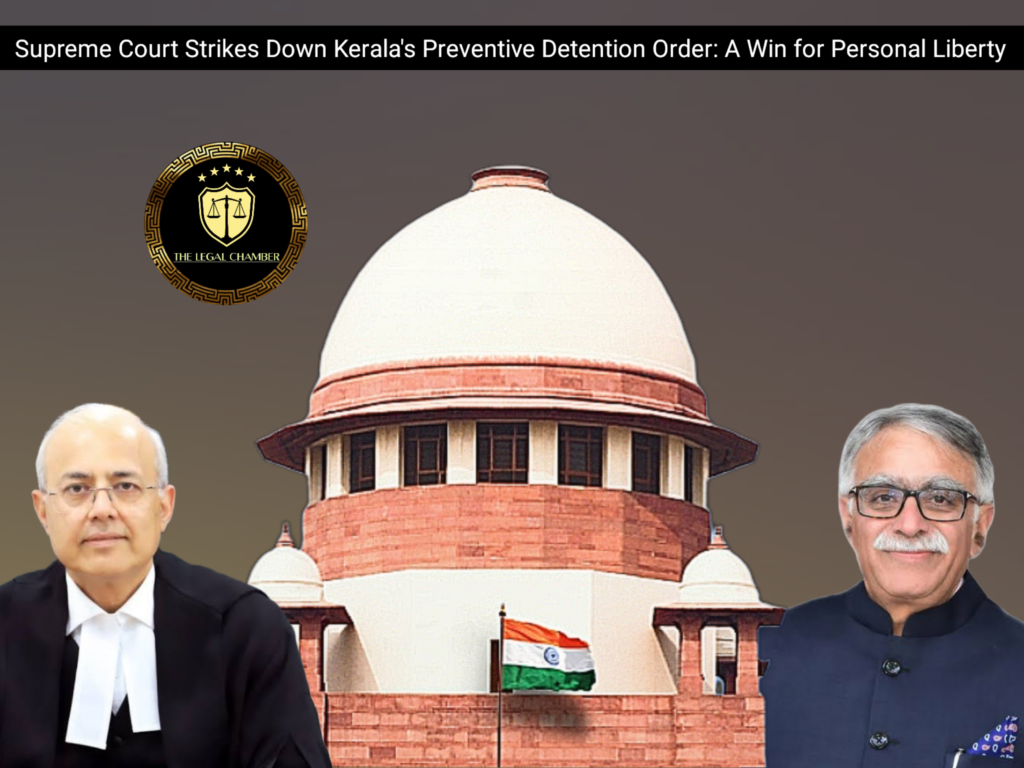
The Supreme Court of India, in Dhanyam v. State of Kerala & Ors., set aside a preventive detention order, emphasizing that such extraordinary power must be used sparingly and only in situations affecting “public order,” not merely “law and order”. The Court reiterated that if a detenu is on bail and allegedly violating conditions, the State should seek bail cancellation rather than resorting to preventive detention.
Facts Of The Case:
The appeal originated from a High Court of Kerala judgment dated September 4, 2024, which affirmed a preventive detention order issued on June 20, 2024, by the District Magistrate, Palakkad. The detenu, Rajesh, the appellant’s husband, runs a registered lending firm named ‘Rithika Finance’. The detention order, issued under Section 3(1) of the Kerala Anti-Social Activities (Prevention) Act, 2007, declared Rajesh a “notorious goonda” and a threat to society. This declaration was based on four criminal cases, including charges under the Kerala Money Lenders Act, 1958, Kerala Prohibition of Charging Exorbitant Interest Act, 2012, and the Indian Penal Code, 1860, among others.Aggrieved by the detention, the appellant filed a writ petition for Habeas Corpus in the High Court of Kerala, which was dismissed. The High Court reasoned that assessing potential acquittals was not within the detaining authority’s purview, that writ jurisdiction doesn’t act as an appeal, and that procedural safeguards were met. The appellant subsequently appealed to the Supreme Court, arguing that the detenu was already on bail and complying with conditions. The detenu was released by the Supreme Court on December 10, 2024, as the maximum detention period under the Act was completed.
Procedural History:
The procedural history of this case began with the District Magistrate, Palakkad, issuing a detention order on June 20, 2024, directing the appellant’s husband, Rajesh, to be held in preventive detention under Section 3 of the Kerala Anti-Social Activities (Prevention) Act, 2007. This order was made in furtherance of a recommendation from the Palakkad District Police Head dated May 29, 2024.Aggrieved by this detention order, the appellant filed a writ petition, WP(CRL) No. 874/2024, before the High Court of Kerala at Ernakulam, seeking a writ of Habeas Corpus against the State of Kerala for the alleged illegal detention of her husband. The High Court of Kerala dismissed this challenge on September 4, 2024, affirming the detention order.Following the High Court’s decision, the appellant preferred an appeal to the Supreme Court of India, leading to Criminal Appeal No. 2897 of 2025, arising out of SLP (Crl.) No. 14740 of 2024. On December 10, 2024, the Supreme Court ordered the release of the detenu, as the maximum period of detention under the Act had been completed. The Supreme Court subsequently set aside the detention order dated June 20, 2024, and the impugned judgment of the High Court dated September 4, 2024, allowing the appeal on June 6, 2025.
READ ALSO :Supreme Court :Threats Alone Can Constitute Extortion “No Need for Money Exchange”| Section 387 IPC
Court Observation:
The Supreme Court emphasized that preventive detention is an extraordinary power that curtails individual liberty in anticipation of future offenses and must be used sparingly and only in rare cases, not in the ordinary course. This power is an exception to Article 21 of the Constitution. The Court reiterated that the detaining authority bears the burden of proving that such actions conform to the procedure established by law, in consonance with Article 21.The Court further observed a crucial distinction between “public order” and “law and order” situations, stating that the Act targets activities “harmful to maintenance of public order”. The Court noted that its previous decisions had set aside detention orders where the situation dealt with law and order, not public order. It was highlighted that public order has a narrower ambit, affecting the community at large, whereas a contravention confined to a few individuals directly involved raises a problem of law and order only. The Court found that the detention order in the present case failed to ascribe reasons as to how the detenu’s actions were against the public order of the State.Finally, the Court observed that if a detenu is on bail and allegedly violating conditions, the appropriate remedy for the State is to move for cancellation of bail, rather than resorting to preventive detention. The Court noted that in this case, no application for cancellation of bail had been filed by the respondent-State in any of the four cases, despite the authority stating the detenu was violating bail conditions. The Court reiterated that the law of preventive detention should be strictly construed and not used merely to keep a person in detention when ordinary criminal law could address the situation.
Final Decision & Judgement:
The Supreme Court concluded that the exercise of power under Section 3 of the Kerala Anti-Social Activities (Prevention) Act was not justified in law. The Court found that the circumstances pointed out in the detention order might be grounds for the State to approach competent courts for bail cancellation, but they did not warrant preventive detention. Consequently, the Supreme Court set aside the detention order dated June 20, 2024, and the impugned judgment dated September 4, 2024, passed by the High Court of Kerala at Ernakulam in WP(CRL.) No. 874/2024. The appeal was therefore allowed. The Court clarified that if an application for cancellation of the detenu’s bail is made by the respondent-State, it must be decided uninfluenced by the observations made in this judgment. All pending applications, if any, were disposed of.
Case Details:
Case Title: Dhanyam Versus State of Kerala & Ors. Citation: 2025 INSC 809 Criminal Appeal No.: CRIMINAL APPEAL NO.2897 OF 2025 Date of Judgment: June 6, 2025 Judges/Justice Name: Sanjay Karol & Manmohan
Download The Judgement Here